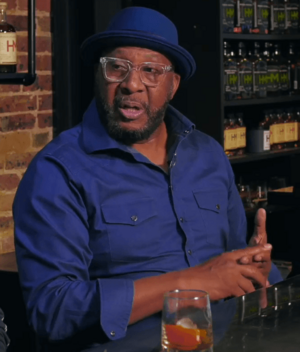Derek Harper facts for kids

Harper in 2023
|
|
| Personal information | |
|---|---|
| Born | October 13, 1961 Elberton, Georgia, U.S. |
| High school | North Shore (West Palm Beach, Florida) |
| Listed height | 6 ft 4 in (1.93 m) |
| Listed weight | 185 lb (84 kg) |
| Career information | |
| College | Illinois (1980–1983) |
| NBA Draft | 1983 / Round: 1 / Pick: 11th overall |
| Selected by the Dallas Mavericks | |
| Pro career | 1983–1999 |
| Career history | |
| 1983–1994 | Dallas Mavericks |
| 1994–1996 | New York Knicks |
| 1996–1997 | Dallas Mavericks |
| 1997–1998 | Orlando Magic |
| 1999 | Los Angeles Lakers |
| Career highlights and awards | |
|
|
| Career NBA statistics | |
| Points | 16,006 (13.3 ppg) |
| Rebounds | 2,884 (2.4 rpg) |
| Assists | 6,577 (5.5 apg) |
Derek Ricardo Harper (born October 13, 1961) is an American former professional basketball player. He played as a point guard in the National Basketball Association (NBA) for 16 seasons. Derek Harper is known for being one of the best players who was never chosen for an All-Star game.
Contents
College Basketball Career
Derek Harper played three seasons for the Illinois Fighting Illini college team. He was a star player, especially in his last year (1982–1983). That season, he led his team in scoring, averaging 15.4 points per game.
Harper was named First-Team All-Big Ten and Second-Team All-American in 1983. He was also recognized as Honorable Mention All-Big Ten in 1981 and 1982. In 2004, he was chosen for the "Illini Men's Basketball All-Century Team." This honor means he was one of the best players in the team's history.
Professional Basketball Career
Derek Harper was chosen by the Dallas Mavericks as the 11th player in the 1983 NBA draft. He played for several teams during his 16 years in the NBA.
Playing for the Dallas Mavericks (1983–1993)
Harper spent his first ten seasons with the Dallas Mavericks. He was a key player, often starting alongside Rolando Blackman. The Mavericks made it to the playoffs six times while Harper was there. In the 1987–1988 season, they even reached the Western Conference Finals.
Harper was known for being a great scorer and a strong defender. His best scoring season was 1990–1991, when he averaged 19.7 points per game. Even with his great play, he was never selected as an All-Star. He left the Mavericks during the 1993–1994 season.
Playing for the New York Knicks (1993–1996)
In the middle of the 1993–94 season, Harper was traded to the New York Knicks. The Knicks needed a good defensive point guard. Harper joined a team that almost won the 1994 NBA Championship.
His personal statistics went down because he had a different role on the Knicks. However, he was an important part of their success. His last season with the Knicks was his best, averaging 14.0 points per game. He became a free agent in July 1996.
Returning to the Dallas Mavericks (1996–1997)
Harper signed with the Dallas Mavericks again in July 1996. He played well at 35 years old, averaging 10.0 points and 4.3 assists per game. This was his final season playing for the Mavericks.
Playing for the Orlando Magic (1997–1998)
The Mavericks traded Harper to the Orlando Magic in 1997. He played one season for the Magic. Even though his scoring dropped, he was a solid player coming off the bench. The Magic team was older, and they missed the playoffs that year. Harper's contract ended in 1998.
Playing for the Los Angeles Lakers (1999)
Harper signed with the Los Angeles Lakers as a free agent. The Lakers were a strong team with young stars like Shaquille O'Neal and Kobe Bryant. They made it to the playoffs, which was Harper's first time since 1996. The Lakers reached the second round but lost to the San Antonio Spurs. This was the last year of Harper's playing career.
Retirement from Basketball
After the 1999 season, the Lakers traded Harper to the Detroit Pistons. However, he decided not to play for them and retired from the NBA.
On January 7, 2018, the Dallas Mavericks honored Derek Harper by retiring his No. 12 jersey. This means no other Mavericks player will ever wear that number again.
Personal Life
Derek Harper lives in Dallas with his family. His daughter, Dana Harper, was a contestant on season 11 of the TV show The Voice. Today, Derek Harper works as a game analyst for the Dallas Mavericks. He helps explain the games during local broadcasts.
Honors and Achievements
- 1981 – Honorable Mention All-Big Ten
- 1982 – Honorable Mention All-Big Ten
- 1983 – Team Captain for Illinois
- 1983 – Team MVP for Illinois
- 1983 – 1st Team All-Big Ten
- 1983 – 2nd Team All-American
- 2004 – Chosen for the "Illini Men's Basketball All-Century Team"
- 2008 – Honored with one of the 33 honored jerseys at the State Farm Center, recognizing him as one of the most celebrated players in University of Illinois basketball history.
- 2018 – Dallas Mavericks #12 jersey retired
Images for kids
See also
 In Spanish: Derek Harper para niños
In Spanish: Derek Harper para niños
 | Roy Wilkins |
 | John Lewis |
 | Linda Carol Brown |


